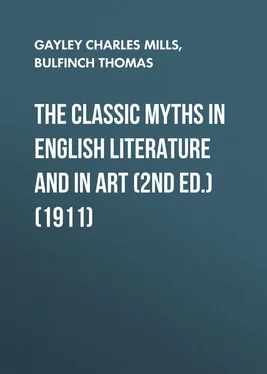Thomas Bulfinch - The Classic Myths in English Literature and in Art (2nd ed.) (1911)
Здесь есть возможность читать онлайн «Thomas Bulfinch - The Classic Myths in English Literature and in Art (2nd ed.) (1911)» — ознакомительный отрывок электронной книги совершенно бесплатно, а после прочтения отрывка купить полную версию. В некоторых случаях можно слушать аудио, скачать через торрент в формате fb2 и присутствует краткое содержание. Жанр: foreign_antique, foreign_prose, на английском языке. Описание произведения, (предисловие) а так же отзывы посетителей доступны на портале библиотеки ЛибКат.
- Название:The Classic Myths in English Literature and in Art (2nd ed.) (1911)
- Автор:
- Жанр:
- Год:неизвестен
- ISBN:нет данных
- Рейтинг книги:4 / 5. Голосов: 1
-
Избранное:Добавить в избранное
- Отзывы:
-
Ваша оценка:
- 80
- 1
- 2
- 3
- 4
- 5
The Classic Myths in English Literature and in Art (2nd ed.) (1911): краткое содержание, описание и аннотация
Предлагаем к чтению аннотацию, описание, краткое содержание или предисловие (зависит от того, что написал сам автор книги «The Classic Myths in English Literature and in Art (2nd ed.) (1911)»). Если вы не нашли необходимую информацию о книге — напишите в комментариях, мы постараемся отыскать её.
The Classic Myths in English Literature and in Art (2nd ed.) (1911) — читать онлайн ознакомительный отрывок
Ниже представлен текст книги, разбитый по страницам. Система сохранения места последней прочитанной страницы, позволяет с удобством читать онлайн бесплатно книгу «The Classic Myths in English Literature and in Art (2nd ed.) (1911)», без необходимости каждый раз заново искать на чём Вы остановились. Поставьте закладку, и сможете в любой момент перейти на страницу, на которой закончили чтение.
Интервал:
Закладка:
3. Quirinus , a war-god, said to be no other than Romulus, the founder of Rome, exalted after his death to a place among the immortals.
4. Bellona , a war-goddess.
5. Lucina , the goddess who brings to light, hence the goddess of childbirth: a title bestowed upon both Juno and Diana.
6. Terminus , the god of landmarks. His statue was a rude stone or post, set in the ground to mark the boundaries of fields.
7. Faunus , the grandson of Saturn. He was worshiped as a god of fields and shepherds and also of prophecy. His name in the plural, Fauni, expressed a class of gamesome deities, like the Satyrs of the Greeks. There was also a goddess called Fauna , or Bona Dea (good goddess). To Maia, wife of Vulcan, this designation, Bona Dea , was sometimes applied.
8. Sylvanus , presiding over forest-glades and plowed fields.
9. Pales , the goddess presiding over cattle and pastures. Flora , the goddess of flowers. Pomona , presiding over fruit trees. Vertumnus , the husband of Pomona, was guardian of fruit trees, gardens, and vegetables.
Pomona loves the orchard,
And Liber loves the vine,
And Pales loves the straw-built shed
Warm with the breath of kine;
And Venus loves the whisper
Of plighted youth and maid
In April's ivory moonlight,
Beneath the chestnut shade. 65 65 From Macaulay's Prophecy of Capys.
10. The Penates , gods who were supposed to attend to the welfare and prosperity of the family. Their name is derived from Penus, the storehouse or inner chamber, which was sacred to them. Every master of a family was the priest to the Penates of his own house.
The Lares , or Lars , were also tutelary deities, but they differed from the Penates since they were regarded as the deified spirits of ancestors, who watched over and protected their descendants. The Lares were more particularly divinities presiding over the household or family; but there were also public Lares, or guardian spirits of the city, Lares of the precincts, Lares of the fields, Lares of the highways, and Lares of the sea. To the Penates, to the domestic Lares (whose images were preserved in a private shrine), and to the Manes (shades that hovered over the place of burial), the family prayers of the Romans were addressed. Other spirits, the Lemures and Larvæ , more nearly correspond to our ghosts.
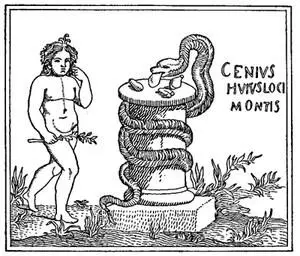
Fig. 44. Genius Loci
The Romans believed that every man had his Genius and every woman her Juno ; that is, a spirit who had given them being and was regarded as a protector through life. On birthdays men made offerings to their Genius, women to their Juno.
11. Other Italian deities were the gods of the rivers, such as Father Tiber , and the goddesses of the springs and brooks, such as Juturna , whose pool in the Forum was sacred. This nymph was also a goddess of healing and, according to later tradition, was beloved by Jupiter. Earlier stories, however, make her the wife of Janus and the mother of Fontus , the god of flowing waters, who had an altar on the Janiculan hill and was worshiped at an annual festival called the Fontinalia, when the wells were wreathed with garlands. Held in especial honor were the Camenæ , fountain-nymphs, goddesses of prophecy and healing (later identified with the Muses). The leader of them was Carmenta , who sang both the future and the past. With her is sometimes associated the nymph Egeria , from whom the Roman king Numa is said to have received instruction concerning the forms of worship which he introduced.
12. The Romans worshiped, also, Sol , the Sun; Luna , the Moon; Mater Matuta , the Dawn; Juventus , Youth; Fides , Honesty; Feronia , goddess of groves and freedmen; and a great number of personified abstractions of conduct and experience, such as Fortune and Health.
Many of these Latin divinities were derived from the earlier cult and ritual of the Etruscan inhabitants of Italy.
CHAPTER VII
MYTHS OF THE GREAT DIVINITIES OF HEAVEN
55. Myths of Jupiter and Juno.Not a few of the adventures of Jupiter turn upon his love affairs. Among the immortals his queen had rivals in his affection; for instance, Latona, a goddess of darkness, daughter of the Titans Cœus and Phœbe. This goddess became, as we have already seen, the mother of Apollo and Diana. The ire of Juno against her was never appeased. In consequence of it, numerous trials were visited upon Latona, some of which find a place among the adventures of her children.
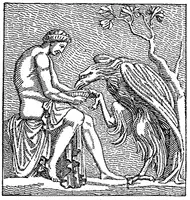
Fig. 45. Ganymede
56. Love Affairs of Jupiter.Not only with immortals but with mortals were Jupiter's relations sometimes of a dubious character. His devotion to the beautiful daughters of men involved him in frequent altercations with his justly jealous spouse. Of his fondness for Danaë, whom he approached in a shower of gold, particulars are given in the story of her son Perseus; of his love for Alcmene, the granddaughter of that Perseus, we are informed in the myths of her son Hercules; and of his attentions to Leda, whom he wooed in guise of a swan, we learn in the accounts of their children Pollux and Helen. Other love passages, upon which narratives depend, concern Io, Callisto, Europa, Semele, Ægina, and Antiope.
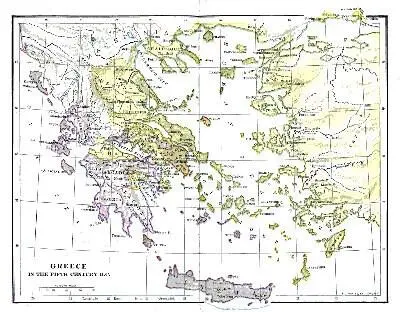
GREECE IN THE FIFTH CENTURY B.C.
57. Io 66 66 Ovid, Metam. I, 700 et seq.
was of divine ancestry. Her father was the river-god Inachus, son of Oceanus. It is said that Juno one day, perceiving the skies suddenly overcast, surmised that her husband had raised a cloud to hide some escapade. She brushed away the darkness and saw him on the banks of a glassy river with a beautiful heifer standing near. Juno suspected, with reason, that the heifer's form concealed some fair nymph of mortal mold. It was Io, whom Jupiter, when he became aware of the approach of his wife, had changed into that form.
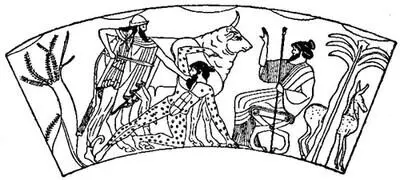
Fig. 46. Hermes Kills Argus
The ox-eyed goddess joined her husband, noticed the heifer, praised its beauty, and asked whose it was and of what herd. Jupiter, to stop questions, replied that it was a fresh creation from the earth. Juno begged it as a gift. What could the king of gods and men do? He was loath to surrender his sweetheart to his wife; yet how refuse so trifling a present as a heifer? He could not, without exciting suspicion, and he therefore consented. The goddess delivered the heifer to Argus, to be strictly watched.
Now Argus had a hundred eyes in his head, and never went to sleep with more than two at a time, so that he kept watch of Io constantly. He suffered her to graze through the day and at night tied a rope round her neck. She would have stretched out her arms to implore freedom of Argus, but that she had no arms to stretch out and her voice was a bellow. She yearned in vain to make herself known to her father. At length she bethought herself of writing, and inscribed her name – it was a short one – with her hoof on the sand. Inachus recognized it, and, discovering that his daughter whom he had long sought in vain was hidden under this disguise, mourned over her. While he thus lamented, Argus, observing, drove her away and took his seat on a bank from whence he could see in every direction.
Читать дальшеИнтервал:
Закладка:
Похожие книги на «The Classic Myths in English Literature and in Art (2nd ed.) (1911)»
Представляем Вашему вниманию похожие книги на «The Classic Myths in English Literature and in Art (2nd ed.) (1911)» списком для выбора. Мы отобрали схожую по названию и смыслу литературу в надежде предоставить читателям больше вариантов отыскать новые, интересные, ещё непрочитанные произведения.
Обсуждение, отзывы о книге «The Classic Myths in English Literature and in Art (2nd ed.) (1911)» и просто собственные мнения читателей. Оставьте ваши комментарии, напишите, что Вы думаете о произведении, его смысле или главных героях. Укажите что конкретно понравилось, а что нет, и почему Вы так считаете.
